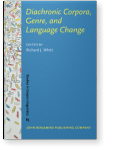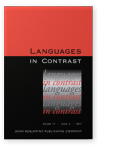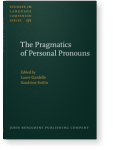Florian Haas
List of John Benjamins publications for which Florian Haas plays a role.
2018 “You can’t control a thing like that”: Genres and changes in Modern English human impersonal pronouns Diachronic Corpora, Genre, and Language Change, Whitt, Richard J. (ed.), pp. 171–194 | Chapter
While there is ample evidence showing that the impersonal use of second-person singular pronouns has increased in several languages, the recent history of impersonal you in English has not yet received much attention in the literature. The present investigation presents corpus evidence from Modern… read more
2017 Motivating an English-German contrast in word-formation Languages in Contrast 17:2, pp. 183–204 | Article
German has a set of nouns which are derived from a combination of a preposition and the reciprocal pronoun einander ‘one another’. Compounds of this type are strikingly absent from English, although all the components that enter the German formations are available in English, as well. This paper… read more
2015 Chapter 15. Impersonal uses of the second person singular and generalized empathy: An exploratory corpus study of English, German and Russian The Pragmatics of Personal Pronouns, Gardelle, Laure and Sandrine Sorlin (eds.), pp. 311–334 | Article
Second person forms of pronouns (e.g. Engl. you, Germ. du) or verbs (e.g. Russian pišeš ‘you write’) have a basically deictic function and refer to the addressee. In uses that have been called “impersonal” or “non-canonical”, the second person forms are used in a generalizing way (e.g. You only… read more
2011 On the distribution of subject properties in formulaic presentationals of Germanic and Romance: A diachronic-typological approach Impersonal Constructions: A cross-linguistic perspective, Malchukov, Andrej L. and Anna Siewierska (eds.), pp. 127–166 | Article
The present study deals with the distribution of subject properties in ‘formulaic’ presentational constructions such as Engl. there is NP, Fr. il y’a NP and Span. hay NP, approaching the problem from a diachronic-typological perspective. Nine major types of presentational constructions are… read more
2009 The aim is to analyze NP: The function of prefabricated chunks in academic texts Formulaic Language: Volume 1. Distribution and historical change, Corrigan, Roberta, Edith A. Moravcsik, Hamid Ouali and Kathleen Wheatley (eds.), pp. 97–116 | Chapter
In the present study we investigate the use and function of prefabricated chunks in academic writing by focusing on what we will term “research predicates”, i.e., high-frequency lexical items designating the research process with its key stages. We conducted a manual analysis of these predicates in… read more




